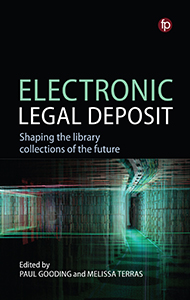
Primary tabs
You don't need to be an ALA Member to purchase from the ALA Store, but you'll be asked to create an online account/profile during the checkout to proceed. This Web Account is for both Members and non-Members.
If you are Tax-Exempt, please verify that your account is currently set up as exempt before placing your order, as our new fulfillment center will need current documentation. Learn how to verify here.
- Description
- Table of Contents
- About the authors
- Reviews
Legal deposit libraries, the national and academic institutions who systematically preserve our written cultural record, have recently been mandated with expanding their collection practices to include digitized and born-digital materials. The regulations that govern electronic legal deposit often also prescribe how these materials can be accessed. Although a growing international activity, there has been little consideration of the impact of e-legal deposit on the 21st Century library, or on its present or future users.
This edited collection is a timely opportunity to bring together international authorities who are placed to explore the social, institutional and user impacts of e-legal deposit. It uniquely provides a thorough overview of this worldwide issue at an important juncture in the history of library collections in our changing information landscape, drawing on evidence gathered from real-world case studies produced in collaboration with leading libraries, researchers and practitioners (Biblioteca Nacional de México, Bodleian Libraries, British Library, National Archives of Zimbabwe, National Library of Scotland, National Library of Sweden). Chapters consider the viewpoint of a variety of stakeholders, including library users, researchers, and publishers, and provide overviews of the complex digital preservation and access issues that surround e-legal deposit materials, such as web archives and interactive media.
The book will be essential reading for practitioners and researchers in national and research libraries, those developing digital library infrastructures, and potential users of these collections, but also those interested in the long-term implications of how our digital collections are conceived, regulated and used. Electronic legal deposit is shaping our digital library collections, but also their future use, and this volume provides a rigorous account of its implementation and impact.
List of Figures
List of Tables
Contributors Foreword — Bethany Nowviskie
Introduction — Paul Gooding and Melissa Terras
1 UK Non-Print Legal Deposit: From Regulations to Review — Linda Arnold-Stratford and Richard Ovenden
2 The Influence of Legal Deposit Legislation on the Digital Collections of the National Library of Scotland — Paul Cunnea, Gill Hamilton, Graeme Hawley and Fred Saunderson
3 E-legal deposit at the Biblioteca Nacional de México (National Library of Mexico) — Isabel Galina Russell, Jo Ana Morfin, Ana Yuri Ramírez-Molina
4 Bibliographic control in Zimbabwe: the conundrum of legal deposit in the age of digital technologies — Collence. T. Chisita, Blessing Chiparausha and Danmore Maboreke
5 Electronic Legal Deposit in Sweden: The Evolution of Digital Publications and Legislative Systems — Eva Lis-Green and Göran Konstenius
6 Publishers, Legal Deposit and the Changing Publishing Environment — Adrienne Muir
7 Making History: Digital Preservation and Electronic Legal Deposit in the Second Quarter of the Twenty-First Century — William Kilbride
8 Giving with one click, taking with the other: electronic legal deposit, web archives and researcher access — Jane Winters
9 Follow the Users: Assessing UK Non-Print Legal Deposit Within the Academic Discovery Environment — Linda Berube and Frankie Wilson
10 'An Ark to Save Learning from Deluge'? Reconceptualising Legal Deposit after the Digital Turn — Paul Gooding and Melissa Terras
Paul Gooding
Paul Gooding is Senior Lecturer in Information Studies at the University of Glasgow. His research focuses on the impact of digital library collections on institutions and users. He was Principal Investigator on Digital Library Futures (2017-2019), an AHRC-funded project to analyze the impact of Non-Print Legal Deposit on UK academic libraries. Paul holds an MA in Library and Information Studies (2007) and a PhD in Digital Humanities (2014) from University College London. From 2014 to 2018 he was Research Fellow in Digital Humanities at the University of East Anglia, where he founded and led the UEA Digital Humanities incubator, and before undertaking his PhD worked as a librarian for BBC Sport.
Melissa Terras
Melissa Terras is the Professor of Digital Cultural Heritage at the University of Edinburgh‘s College of Arts, Humanities, and Social Sciences. With a background in Classical Art History, English Literature, and Computing Science, her doctorate (Engineering, University of Oxford) examined how to use advanced information engineering technologies to interpret and read Roman texts. Publications include Image to Interpretation: Intelligent Systems to Aid Historians in the Reading of the Vindolanda Texts (2006, Oxford University Press) and Digital Images for the Information Professional (2008, Ashgate) and she has co-edited various volumes such as Digital Humanities in Practice (Facet 2012) and Defining Digital Humanities: A Reader (Ashgate 2013). She is currently serving on the Board of Curators of the University of Oxford Libraries, and the Board of the National Library of Scotland, and is a Fellow of the Chartered Institute of Library and Information Professionals and Fellow of the British Computer Society. Her research focuses on the use of computational techniques to enable research in the arts and humanities that would otherwise be impossible. You can generally find her on twitter at @melissaterras.
"This book brings together different voices, UK and international, to capture the joint endeavour between libraries and publishers to systematically collect and preserve the national collection of electronic publications, from websites to e-books. Critically, the editors use those contrasting voices to challenge the current model, resulting in a volume that both records the story so far and issues a call for policy change in the future evolution of e-legal deposit; a future shaped more clearly by the needs of research and access."
— Dr. Jessica Gardner, University Librarian & Director of Library Services at Cambridge University Libraries


